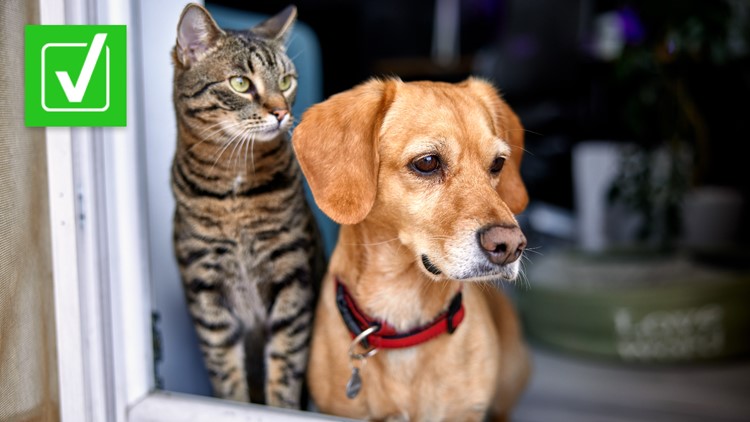Poor air quality can irritate your pet’s eyes and respiratory tract. We VERIFY ways you can keep your pet safe from wildfire smoke inside and outside of your home.


Intense smoke from Canadian wildfires continues to blanket parts of the U.S. East Coast and Midwest, triggering air quality alerts warning people to stay inside and keep their windows closed. VERIFY has shared tips on how people can stay safe in their homes and outdoors when it’s smoky outside.
But online searches show that many people are wondering how to protect their pets from wildfire smoke. Multiple VERIFY viewers, including Julie, are asking questions too, such as if it’s safe for pets to go outside when the air quality is poor and if you should put a mask on your dog.
THE QUESTION
Does poor air quality from wildfire smoke affect pets?
THE SOURCES
THE ANSWER
![]()
Yes, poor air quality from wildfire smoke affects pets.
WHAT WE FOUND
Poor air quality from wildfire smoke can cause potential health problems for pets, according to the American Veterinary Medical Association (AVMA), AirNow, the American Kennel Club and Filtrete by 3M. Animals with heart or lung disease and older pets are especially at risk from smoke irritation and should be closely watched during all periods of poor air quality.
The Air Quality Index (AQI) is a tool that measures daily air quality levels. The AQI ranges from 0 to 500 and is divided into six color-coded categories: good (green), moderate (yellow), unhealthy for sensitive groups (orange), unhealthy (red), very unhealthy (purple) and hazardous (maroon).
“The higher the AQI value, the greater the level of air pollution and the greater the health concern,” AirNow says on its website. “For example, an AQI value of 50 or below represents good air quality, while an AQI value over 300 represents hazardous air quality.”
Poor air quality from wildfire smoke can irritate your pet’s eyes and respiratory tract, according to AirNow. To protect your pet, our sources say you should:
- Keep pets indoors as much as possible, and keep doors and windows closed.
- Let dogs and cats outside only for brief bathroom breaks when air quality alerts are in effect.
- Pet birds, who are particularly susceptible to smoke irritation, should not be allowed outside.
- Avoid long walks and intense outdoor exercise during periods of poor air quality.
- Keep indoor air clean: do not fry or broil foods, vacuum, burn candles, use a fireplace or wood stove, or smoke tobacco products. These activities can add particles to your home.
One VERIFY viewer asked if they should put a mask on their dog if they go outside — but the American Kennel Club does not recommend doing so.
“While most people have gotten used to wearing face masks to combat COVID-19, they can also be a tool for protecting humans against poor air quality. Not enough research has been done to support masks’ possible effectiveness with regard to protecting animals. The best plan is to keep both you and your pets indoors as much as possible,” the American Kennel Club says.
The AVMA, AirNow and the American Kennel Club recommend looking out for the following warning signs that your pet may have inhaled too much smoke:
- Coughing or gagging
- Difficulty breathing, including open-mouth breathing and increased noise when breathing
- Eye irritation and excessive watering
- Inflammation of the throat or mouth
- Nasal discharge
- Asthma-like symptoms
- Increased breathing rate
- Fatigue or weakness
- Disorientation, uneven gait or stumbling
- Reduced appetite or thirst
- Reluctance to eat hard foods
If any of your pets are experiencing any of these signs, you should contact your veterinarian as soon as possible. Click here to check on the air quality in your area.
The Associated Press contributed to this report.
The VERIFY team works to separate fact from fiction so that you can understand what is true and false. Please consider subscribing to our daily newsletter, text alerts and our YouTube channel. You can also follow us on Snapchat, Twitter, Instagram, Facebook and TikTok. Learn More »
Follow Us
Want something VERIFIED?
Text: 202-410-8808
.png)









 English (US) ·
English (US) ·